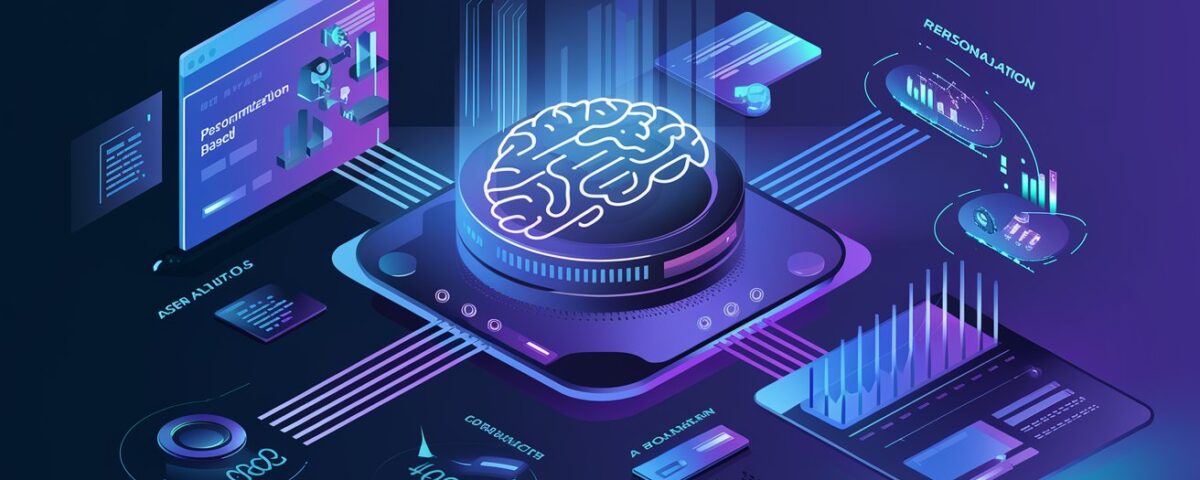
AI for Lead Scoring and Prioritization
March 19, 2025
Optimizing Supply Chain Marketing with AI Insights
March 20, 2025In today’s digital landscape, user expectations have evolved significantly. Consumers demand seamless, engaging, and highly personalized experiences across websites and online platforms. Traditional methods of personalization, such as manually curated recommendations or static user segments, no longer suffice in an era where data is generated in real-time and user preferences change dynamically.
Artificial Intelligence (AI) has revolutionized website personalization by enabling real-time customization of content, products, and experiences based on user behavior, preferences, and intent. AI-driven personalization ensures that every visitor sees a version of a website that caters specifically to their interests, thereby improving engagement, customer satisfaction, and conversion rates.
In this article, we explore how AI powers real-time website personalization, the technologies behind it, and how businesses can leverage AI to create meaningful, tailored experiences for their users.

The Role of AI in Website Personalization
AI-driven personalization relies on advanced technologies such as machine learning (ML), natural language processing (NLP), and predictive analytics to understand user behavior and deliver customized experiences.
- Machine Learning (ML): ML algorithms analyze vast amounts of user data to identify patterns, predict preferences, and make recommendations accordingly. These algorithms continuously learn and refine personalization strategies based on user interactions.
- Natural Language Processing (NLP): NLP helps websites understand user intent by analyzing text inputs such as search queries, product reviews, or chatbot interactions. This enables the delivery of relevant content and recommendations.
- Predictive Analytics: By analyzing historical and real-time data, AI can anticipate user needs and suggest actions that enhance engagement, such as recommending similar products or personalizing marketing messages.
By combining these technologies, AI can dynamically adjust website content, layout, and offerings to match the unique preferences of each visitor, ensuring a more personalized user experience.

How AI Collects and Analyzes User Data
To provide real-time personalization, AI must first gather and analyze user data. Websites collect data from multiple sources, including:
- User Behavior Tracking: AI monitors actions such as page views, time spent on pages, scroll depth, clicks, and mouse movements to understand user intent.
- Customer Segmentation: AI classifies users into different segments based on demographics, browsing habits, and past interactions, allowing for targeted personalization.
- Dynamic User Profiling: AI continuously updates user profiles with new data, ensuring that personalization remains relevant and accurate over time.
The real-time nature of AI-driven data analysis allows websites to instantly adjust their offerings to meet user expectations, creating a highly customized browsing experience.

Real-Time Personalization Strategies with AI
AI enables several strategies for real-time personalization, including:
- Personalized Content Recommendations: AI suggests blog posts, articles, or products based on the user’s previous interactions. Platforms like Netflix and Amazon excel in this by offering tailored content suggestions.
- Adaptive UI Adjustments: Websites can dynamically modify their layout, color schemes, or navigation elements based on user preferences.
- AI-Driven Chatbot Assistance: AI chatbots provide personalized responses and product recommendations by analyzing past interactions.
- Dynamic Pricing and Offers: AI adjusts product pricing and promotions based on user behavior, demand, and purchase history, ensuring the most relevant deals are presented.
These strategies enhance user engagement and ensure that visitors receive a customized experience in real-time.

AI-Powered Personalization in E-Commerce
E-commerce websites heavily rely on AI-driven personalization to increase conversions and sales. Some key applications include:
- AI-Driven Product Recommendations: AI analyzes customer behavior to suggest relevant products, increasing the likelihood of a purchase.
- Smart Search and Voice Search Optimization: AI-powered search engines refine search results based on user intent and past interactions.
- Predictive Customer Behavior Analytics: AI predicts future purchases and recommends products accordingly, improving the shopping experience.
By offering personalized recommendations and intelligent search functionalities, AI enhances the e-commerce experience and drives customer satisfaction.

AI in Content Personalization for Blogs and News Websites
AI optimizes content personalization by:
- Generating Personalized Content Feeds: AI recommends articles based on reading habits, ensuring that users engage with relevant content.
- Sentiment Analysis for Customized Reading Suggestions: AI assesses sentiment in user comments and interactions to curate personalized content.
- Automated Content Tagging and Classification: AI categorizes content efficiently, making it easier for users to find relevant information.
News platforms like Google News and Flipboard use AI-driven personalization to deliver curated content tailored to individual reading preferences.

AI in Personalized Marketing and Advertising
AI revolutionizes digital marketing by enabling:
- AI-Powered Email Marketing: AI personalizes email subject lines, content, and send times based on user engagement.
- Dynamic Ad Targeting and Retargeting: AI delivers ads tailored to individual users, improving ad relevance and ROI.
- Personalized Push Notifications: AI sends real-time notifications based on user behavior, increasing engagement.
By leveraging AI, marketers can create highly targeted and effective campaigns that resonate with individual users.

AI in UX/UI Personalization
AI enhances user experience by:
- Adaptive Website Layouts: AI adjusts website structure based on user preferences.
- Personalized Navigation and Menu Structures: AI optimizes website menus based on frequently visited pages.
- AI-Driven A/B Testing: AI automates A/B testing to determine the best UI/UX configurations.
By making real-time adjustments, AI ensures a smoother, more user-friendly browsing experience.

Ethical Considerations in AI-Powered Personalization
Despite its benefits, AI-driven personalization raises ethical concerns, including:
- User Privacy and Data Protection: Websites must balance personalization with data privacy regulations such as GDPR and CCPA.
- Transparency in AI Algorithms: Users should have visibility into how AI influences their experience.
- Avoiding Bias in AI Personalization: AI must be trained on diverse datasets to prevent biases in recommendations.
Ensuring ethical AI implementation is crucial for maintaining user trust and compliance with regulations.
Conclusion
AI-driven real-time personalization is transforming website experiences by delivering tailored content, recommendations, and interactions. By leveraging AI technologies such as machine learning, predictive analytics, and NLP, businesses can create dynamic, engaging experiences that cater to individual users.
As AI continues to evolve, the future of website personalization will become even more sophisticated, offering deeper levels of customization and engagement. Companies that embrace AI-powered personalization will gain a competitive edge by providing more meaningful, user-centric digital experiences.


